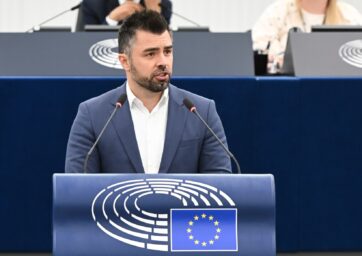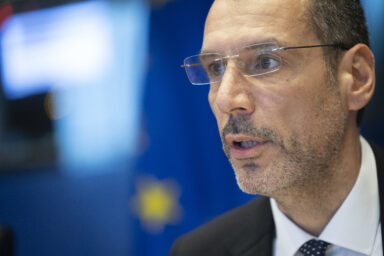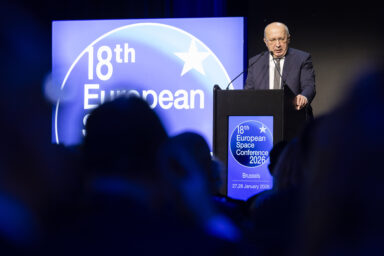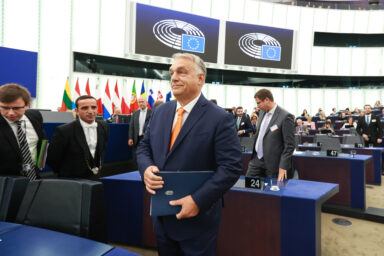European health systems are not just short of people. Above all, they are short of protection for the people who keep them running. Lawmakers therefore call for safe-staffing standards and mental health protection.
“Our health workers are exhausted, overworked, underpaid, under pressure, and unsupported, all while we are facing a shortage of nearly one million health workers by 2030,” said Hans Kluge, WHO Regional Director for Europe, ahead of this week’s 75th WHO Regional Committee for Europe (Copenhagen, 28–30 October 2025). “I commit to advocating on their behalf, fighting for fair pay, safe conditions, mental-health support, and respect. Standing up for our health workers isn’t charity – it’s survival. Without a protected and motivated workforce, there can be no health for all.”
In line with Mr Kluge’s argument, members of the European Parliament believe the Union’s health systems are undergoing an emergency. They identify exhaustion, violence and insecurity among health care staff as the root cause of the crisis. That, in short, was the message from last week’s parliamentary debate on the EU Health Workforce Crisis Plan.
Meeting jointly in Strasbourg on 23 October, the Employment (EMPL) and Public Health (SANT) committees discussed a draft report on “An EU Health Workforce Crisis Plan”. It constitutes the first parliamentary initiative to treat mental health protection and safe-staffing standards as integral to Europe’s health security.
The pressures will intensify
Presenting the draft report, Loucas Fourlas (EPP/CYP), speaking through his delegate MEP Jagna Marczulajtis-Walczak (EPP/POL), warned that the cracks in Europe’s health systems had widened since the pandemic. “The pandemic exposed pre-existing gaps, staff shortages, unequal conditions, mental strain, administrative bureaucracy, gaps in qualification recognition and insufficient digital interoperability. If we fail to act now, these pressures will only intensify,” the Polish Christian democrat said on behalf of Mr Fourlas.
The draft report sets out a plan for a coordinated European response, structured around employment and mental health. It is to tackle inequalities in access, mobility and training, digital transformation, long-term planning, and ethical work models.
You might be interested
Mr Fourlas described the proposal as “open, inclusive and result-orientated”. It is “not an ideological text, but a plan of action”, he let it be known.
Five lines of action
The draft report sets out five main lines of action. First, it calls for the creation of safe-staffing frameworks. A Council recommendation is to provide the initial spark; national standards to define minimum staffing levels and consultation times are to follow. Second, it urges mental health and safety guarantees for health workers. This includes zero-tolerance policies on workplace violence, access to psychological-support services, and predictable shift patterns.
Third, it prioritises retention before recruitment. It aims to set an EU-wide goal of increasing the healthcare workforce by one million professionals within seven years. The plan is to draw financing from ESF+, EU4Health and the Cohesion Funds. Fourth, the report advocates for digitalisation that helps rather than harms, with technology designed to “support, not replace professional judgement,” as co-rapporteur MEP Ruggero Razza (ECR/ITA) emphasised.
Finally, it calls for long-term investment and planning, urging the Commission to treat health workforce investment as productive spending under the EU’s fiscal rules. MEPs from across the political spectrum backed the push for a European framework that protects those who deliver care rather than merely expanding training pipelines.
The evidence behind the alarm
The WHO/Europe October Mental Health of Nurses and Doctors (MeND) survey paints a stark picture of the pressures facing Europe’s health workforce. Conducted across all 27 EU member states (plus Iceland and Norway) and based on more than 90 000 responses, it found that one in three doctors and nurses reported symptoms of depression or anxiety. One in ten said they had recently had thoughts of being “better off dead” or “hurting themselves”, so-called passive suicidal thoughts known to predict future self-harm.
The study also showed that one in three health workers experienced bullying or violent threats in the past year, while 10 percent suffered physical violence or sexual harassment. One in four doctors work more than 50 hours a week, and nearly a third hold temporary contracts, conditions that have created chronic insecurity and fatigue across the profession.
Europe’s health workers are exhausted, and they need support now. — Hans Kluge, WHO regional director for Europe
WHO warns that such unsafe and unsupported working conditions are now a health-security risk. Depending on the country, up to 40 per cent of doctors and nurses with depressive symptoms took sick leave in the past year, and between 11 and 34 per cent are considering leaving their jobs. Without urgent action, Europe faces a projected shortage of 940 000 health workers by 2030.
A call from Copenhagen
WHO’s Hans Kluge issued an unambiguous warning: “Europe’s health workers are exhausted – and they need support now. One in three doctors and nurses across 29 countries (EU 27 plus Iceland and Norway) reports depression or anxiety, and one in ten has thought about ending their own life,” he pained a somber picture.
As Parliament moves to translate that call into legislation, one measure is already shifting. Europe’s healthcare strength will no longer be counted only in hospital beds, but in the safety, sanity and sustainability of those who keep them filled.
The deadline for amendments to the crisis plan is 4 November (12:00), with the next joint session due 24 February 2026.











